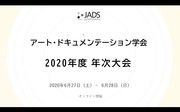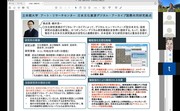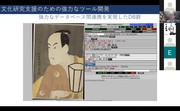-
ARC-iJAC co-hosted the 2020 Annual Conference of the Japan Art Documentation Society (JADS) on June 27 and 28June 29, 2020(Mon)
 The Annual Conference of the Japan Art Documentation Society (JADS), hosted by the Japan Art Documentation Society (JADS) in cooperation with the MEXT International Joint Usage / Research Center International Joint Digital Archiving Center for Japanese Art and Culture (ARC-iJAC), Art Research Center, Ritsumeikan University, took place on June 27 (Sat) and 28 (Sun), 2020.
The Annual Conference of the Japan Art Documentation Society (JADS), hosted by the Japan Art Documentation Society (JADS) in cooperation with the MEXT International Joint Usage / Research Center International Joint Digital Archiving Center for Japanese Art and Culture (ARC-iJAC), Art Research Center, Ritsumeikan University, took place on June 27 (Sat) and 28 (Sun), 2020.To prevent the spread of the coronavirus, the event was held online for the first time this year and more than 130 members and non-members of the JADS participated.
As part of this year's annual conference, a symposium on 「芸術文化資源デジタル・アーカイブの国際的共同利用 -- オンライン環境での知的生産システムとそのツール」 (The International Joint Usage of Digital Archives for Arts and Cultural Resources -- Intelligent Production Systems and their Tools in an Online Environment) was held.
 The symposium began with a welcome speech by Prof. Koichi Hosoi, Director of the Art Research Center (ARC), who introduced the international research activities of the ARC-iJAC in the field of digital humanities.
The symposium began with a welcome speech by Prof. Koichi Hosoi, Director of the Art Research Center (ARC), who introduced the international research activities of the ARC-iJAC in the field of digital humanities.Following his opening remarks, three presenters proposed activities and tools for the next generation of digital research environments in light of the role of digital archives until now which only had a focus on reference information. In this context, they discussed ways and future directions to construct an online knowledge cycle for arts and cultural resources.
Among these three speakers, Mitsuhiro Tsuda, a researcher at the Art Research Center, publicly presented the concept and utilization of the ARC Research Space and ARC Database for the first time and explained their role in effectively building relationships between digital resources and intellectual activities.
 In supporting the activities of the Japan Art Documentation Society (JADS), the ARC-iJAC aims to contribute to the establishment of such an online knowledge cycle which may enable researchers, curators and librarians not only to "browse" information, but also archive the "relationships" between these resources and produce new knowledge by "editing" and "re-archiving" them in the future.
In supporting the activities of the Japan Art Documentation Society (JADS), the ARC-iJAC aims to contribute to the establishment of such an online knowledge cycle which may enable researchers, curators and librarians not only to "browse" information, but also archive the "relationships" between these resources and produce new knowledge by "editing" and "re-archiving" them in the future.













